How To Do A Background Check For Employment
Learn how to run a background check for employment to make informed, fair, and compliant hiring decisions
Resourcesarticles
Sara Korolevich
24 min read
Click a chapter to scroll directly to it.
4,000 American workers of all ages — Baby Boomers, Gen X, Millennials, and Gen Z — share their feelings on the meaning of work in 2021, intense desires for a four-day workweek, what they hate the most about their jobs, and much more.
At GoodHire, we surveyed a total of 4,000 full-time American workers, an equal number from each “working generation,” to better understand what work means to individuals in different phases of both life and their careers.
Throughout the survey, we uncovered similarities and differences between the four generations, while discovering a handful of shocking trends.
Our study also revealed happiness levels at work; discovered what age group hates their jobs most; disclosed whether or not work-life balance is a real thing; explained how desirable a four-day workweek might be, along with many other eye-opening opinions from full-time workers.
In addition to that timely information, we’ll share more about the workforce sentiment on remote opportunities, compensation satisfaction, and generational loyalty to current employers.
Before we get into the data recap, let’s take a look at the age groups for each generation we surveyed:
Now, let’s look at the key findings:
Now, let’s get into the full breakdown of our survey and the information gathered.
COVID-19 has placed a major burden on businesses and employees across the country. Millions of Americans have unfortunately lost their jobs during the global pandemic and those fortunate enough to have remained employed during these difficult times have started to reimagine the way they think about work and life.
Remote work, increased autonomy, daily flexibility, layoffs, and decreases in pay have all led to a shift in mindset for the American workforce. Rather than just going through the motions of a nine-to-five, employees are now pondering the meaning of work.
More employees are vocalizing unhappiness at work and connecting workplace unhappiness to issues in their personal lives. Clearly, judging by The Great Resignation statistics, many have realized that happiness at work might have never existed for them.
With that in mind, we asked each generation if they are truly happy at work. Unsurprisingly, just 48% of all people surveyed — Baby Boomers down to Gen Z — said they were very happy at work.
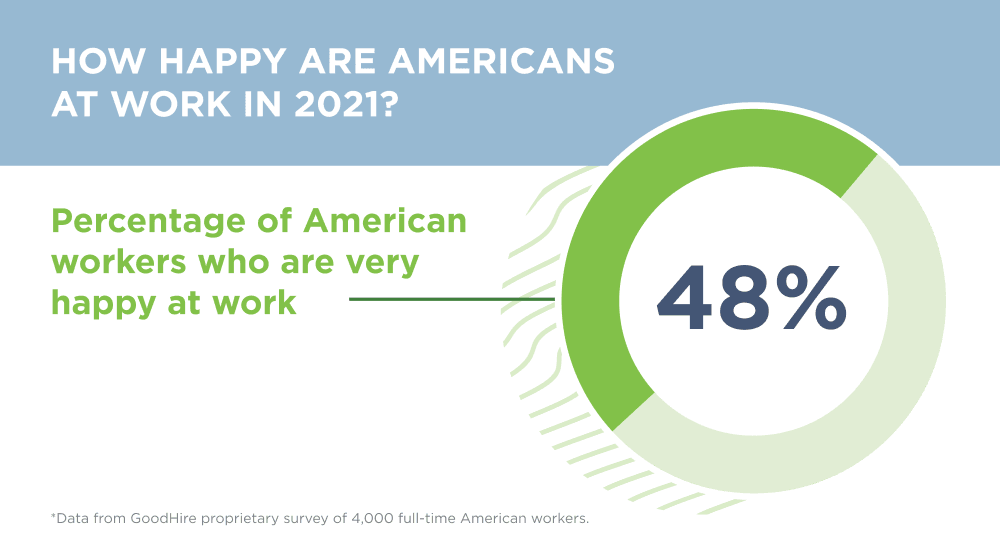
Additionally, when we asked individual generations about their happiness level at work, the data revealed that Millennials are, in fact, the happiest of all generations. 57% of Millennials — people of ages 25 to 40 — confirmed they were very happy at work.
On the other end of the spectrum, just 41% of Baby Boomers and Gen Z respondents claimed to be very happy at work, with Gen X — ages 41 to 56 — floating in the middle at 52%.
Interestingly, Millennials, a generation of people that many have perceived to be entitled and disgruntled in the workplace, lead the pack when it comes to overall happiness at work. Who would’ve thought?
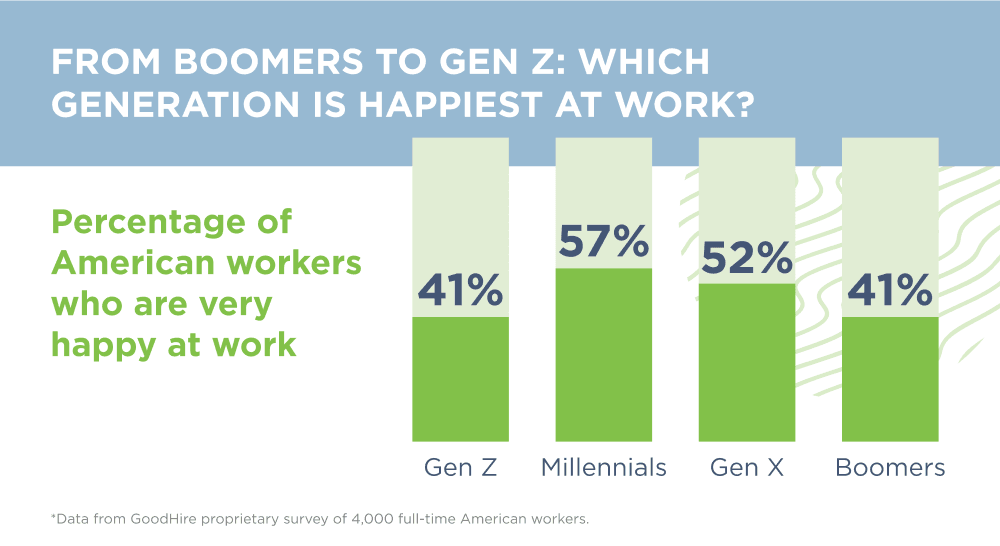
Our research shows that Millennials are the generation that feels the highest level of happiness at work, but that doesn’t tell the whole story. What about the lowest level of happiness?
Well, that crown belongs to Gen Z. When asked about unhappiness and hatred of work, 22% of Gen Z workers — ages 18 to 24 — said they were either unhappy or hated their jobs.
Gen Z’s level of dislike toward work is almost matched by Baby Boomers — ages 57 to 75 — as 19% of this generation shared the same feelings about the daily grind. On top of that, just 16% of Gen X members and 12% of Millennials echoed that sentiment.
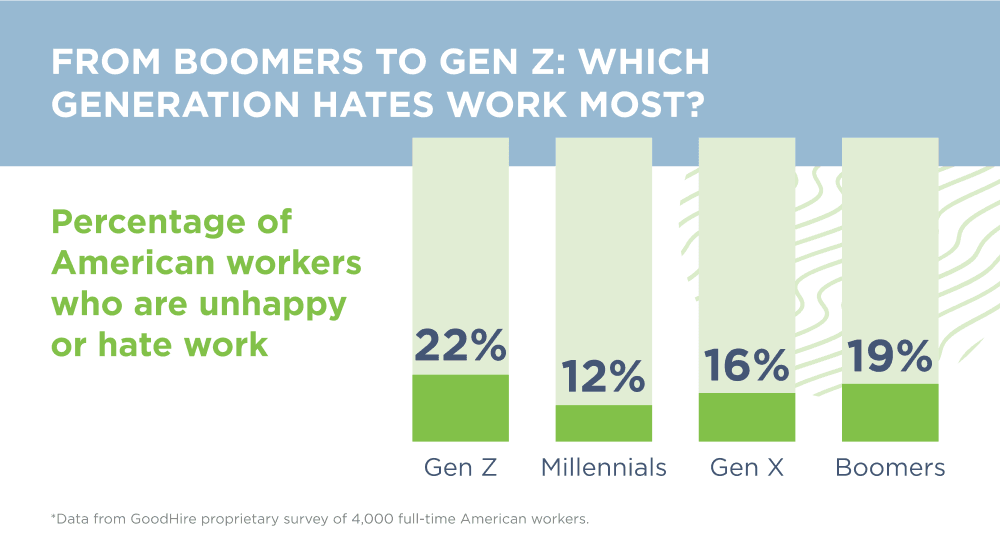
So, what causes those unhappy feelings? To wrap up the conversation about unhappiness in the workplace, we asked each generation to share what bothers them most about work.
The results feel like a quick PSA to employers and bosses:
So, there you have it.
When it comes to one of the most basic components of work — true happiness — Millennials come out on top, while Gen Z trails all groups with the highest percentage of unhappy workers. And not shockingly, bosses are the biggest bother for most.
Meaning. Purpose. Fulfillment. Satisfaction.
One would think employees would strongly desire these feelings from something they do five days per week. But the “why of work” is often ignored in favor of money, job title, and status.
As COVID-19 pushed more employees to better understand their “why” at the office, we set out to uncover generational trends and differences about the often-overlooked meaning and purpose at work.
Our research shows that age does influence meaning and purpose on the job. Again, just like with workplace happiness, Millennials feel the best about their “why of work”, with 60% sharing that they find great meaning and purpose on the job.
Following the seemingly always-happy Millennials are Gen X members. 51% of them find great meaning and purpose at work.
On the low end, Baby Boomers (44%) and Gen Z (41%) admit to finding less meaning and purpose.
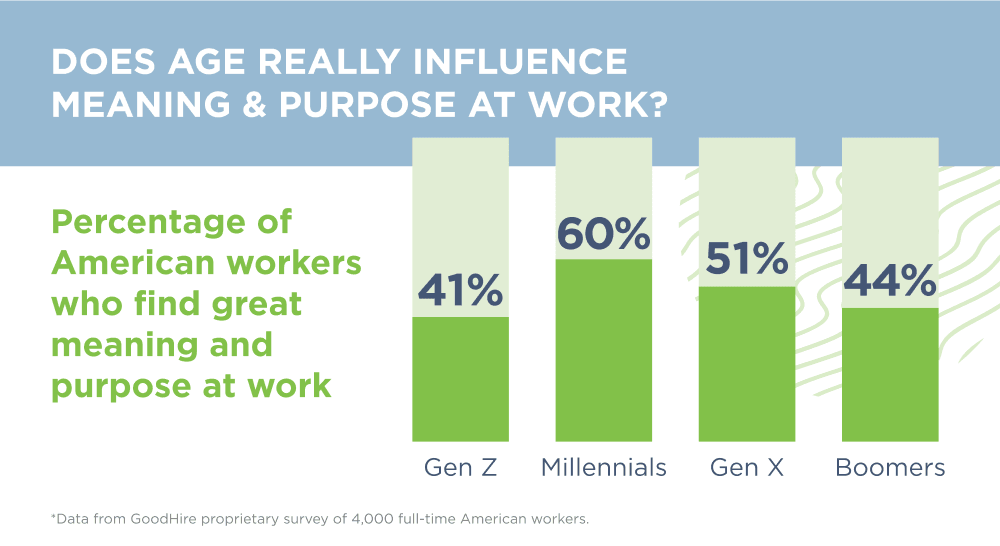
The generational divide is clear. But why?
Many have hypothesized that Millennials and Gen X members might find more meaning, purpose, fulfillment, and satisfaction at work because of their current stage of life — young, but not too young; old, but not too old. And wiser, but not too wise to become cynical. Perhaps Millennials and Gen X members are in the sweet spot when it comes to the combination of age and work.
Compare them to Gen Z — higher likelihood to have entry-level jobs, lower pay, minimal amounts of autonomy, and a long road to get where they want to go. These are things that might create a lack of meaning and purpose at work.
Lastly, Baby Boomers. Do they not find meaning and purpose at work because they don’t want to be working anymore? Did they lose their retirement funds in The Great Recession of 2008? Retirement is much closer for this group and it’s likely that they do not want to spend more time at work at this stage in their lives.
Work-life balance is hugely important and often ignored. The hustle culture of today has seemingly created badges of honor for things that aren’t healthy for many Americans, such as rising before the sun to catch a flight for a full day of sales meetings; working late nights managing a hotel bar; spending 80-hour weeks at a new construction site; losing valuable hours of sleep in favor of more hours spent on spreadsheets, among other things.
But is this what people really want or just something everyone thinks they need to do to keep up?
COVID-19 is causing mental health issues related to isolation — even professional athlete superstars like Naomi Osaka and Kevin Love are opening up about mental health struggles. It’s clear that proper mental health care and work-life balance are valued now more than ever before, no matter what the occupation might be.
With that in mind, we set out to understand whether or not American workers are satisfied with their work-life balance. We found that the majority of all generations, besides Millennials, are not completely satisfied with their work-life balance.
69% of Gen Z members are not completely satisfied with their work-life balance, joined by 63% of Baby Boomers and 55% of Gen X members that feel like their work-life balance could use an improvement.
Millennials are the only generation where the majority (although a small one, just 52%), feels like their work-life balance is completely satisfactory.
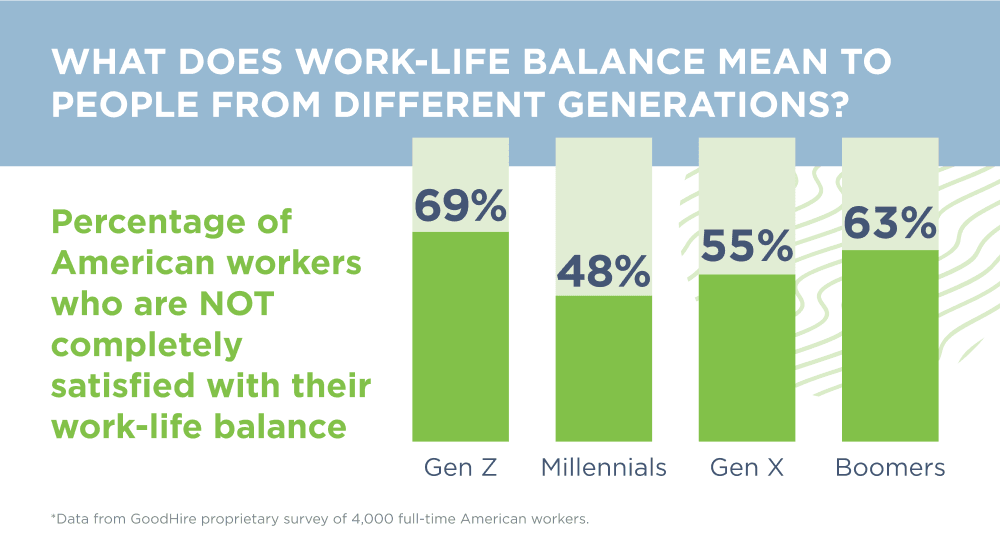
So, in order to achieve a better work-life balance, what needs to be done?
First, let’s take a look at the employee side of this argument. We asked what workers would give up in order to improve their work-life balance and here’s what we found.
Baby Boomers shared that they would be most willing to give up promotions and career advancement for better work-life balance, while Gen X and Millennials continued on their similar trends stating they would forfeit a percentage of their salary. Gen Z, clearly in a different stage of work and life, said they would be most willing to sacrifice paid time off for a better work-life balance.
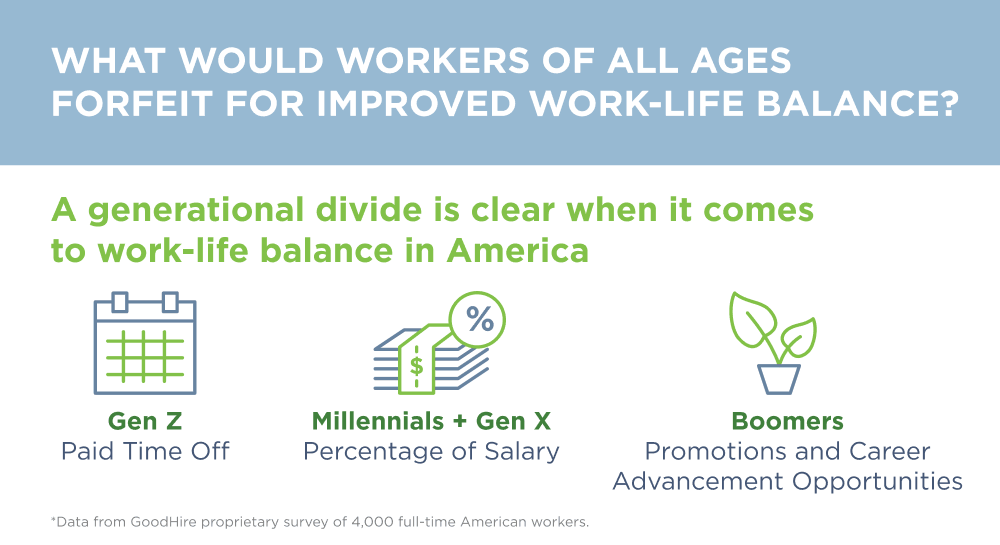
Next, let’s dive into the employer side and the potential adoption of a four-day workweek.
The push for a four-day workweek has been gaining traction all across the world in recent years. Many argue that a shorter workweek is better for workers, for business, and for society in general. Studies that analyzed Iceland’s journey to a shorter workweek have been published and the results are glaring. Worker wellbeing dramatically increased and stress and burnout plummeted with a shorter workweek.
Some American companies have adopted the four-day workweek, but what is everyone else waiting for?
While some might argue that COVID-19 has crushed Americans’ dreams of a shorter workweek as remote employees have been working more and not less, we wanted to know what American workers of all ages really think about a four-day workweek.
When asked, if given the opportunity, would they prefer a four-day workweek, an overwhelming consensus was shown. 83% of all respondents would prefer a four-day workweek.
Viewed by generation, the picture becomes even more clear. We’ve seen throughout this report that there is a clear generational divide about work in general. But when it comes to the length of the workweek, there is absolutely no divide.
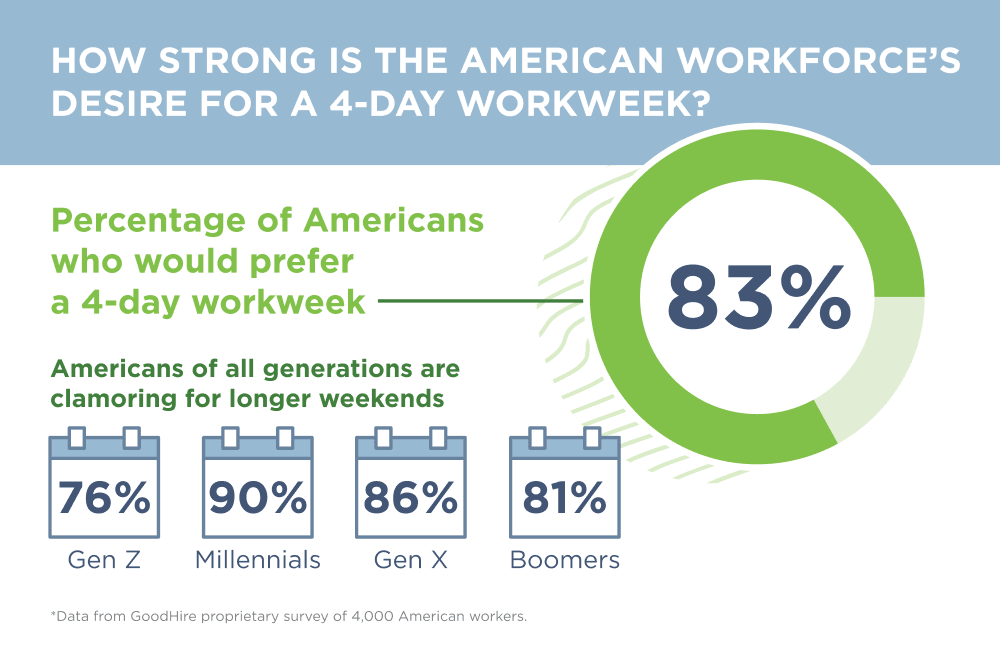
Baby Boomers (83%), Gen X (86%), Millennials (90%), and Gen Z (76%) are all very much in favor of shortening the workweek.
While happiness, meaning, purpose, and many other aspects of work are viewed differently by people from all generations, the four-day workweek is not something they disagree on.
We’ve learned about the strong desire for a four-day workweek and the generational agreement on that topic. But, from that, another question arises: would employee compensation be impacted by a shorter workweek?
That is a question we cannot answer at this time. But to start that conversation, we need to know whether or not American workers are happy with the pay they currently receive for their work.
We asked respondents if they were very happy with their compensation, and just like the generational agreement we saw from the shorter workweek debate, respondents of all generations seem to be not-so-happy with their pay.
In fact, only 30% of Baby Boomers are very happy with their pay. Joining them with that same sentiment on compensation are 42% of Gen X members, 47% of Millennials, and 32% of Gen Z members.
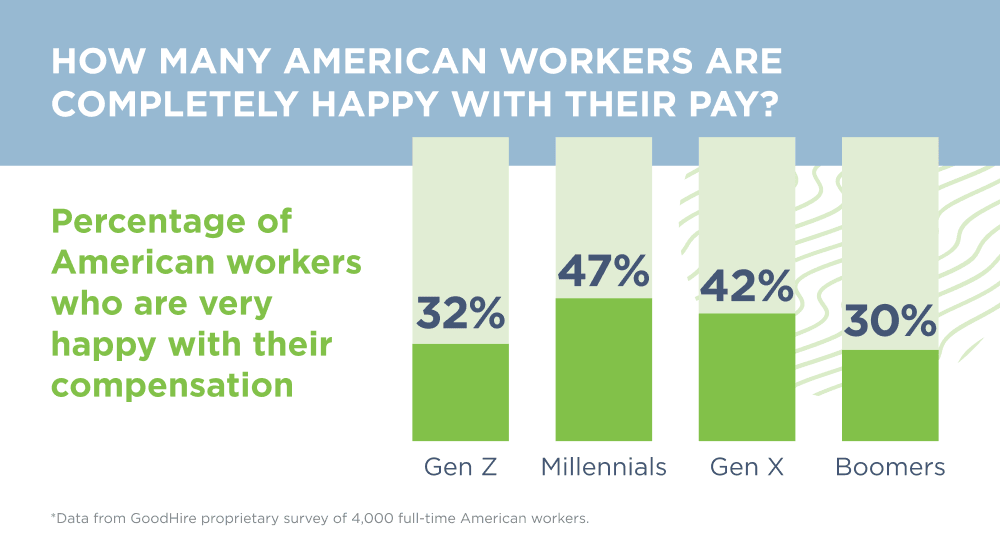
A divide still exists between all of the working generations, but a few similarities are starting to creep in. And hey, doesn’t everyone want to get paid more for their time?
GoodHire recently published a report on the State of Remote Work in 2021. In this survey, we uncovered that the majority of employees would prefer to work remotely and many would even sacrifice a percentage of their pay to do so.
Since remote work remains one of the most controversial and heavily debated topics in the workplace and data in this report showing work-life balance is a major issue among employees in America, we wanted to know more about remote work on a generational level.
Our data revealed that a generational divide again exists within the remote work debate. When asked if they were happier because of remote working opportunities, just 37% of Baby Boomers said yes.
Opposing viewpoints were shared by the three other generations, with 50% of Gen Z members, 58% of Gen X members, and 68% of Millennials saying they were happier working remotely.
Next, we asked if remote work was negatively affecting engagement and satisfaction on the job.
Surprisingly, we found that all generations agreed in an overwhelming fashion. On average, across all four generations, just 9% of Americans surveyed said they felt less engaged and less satisfied with work because of a remote setup.
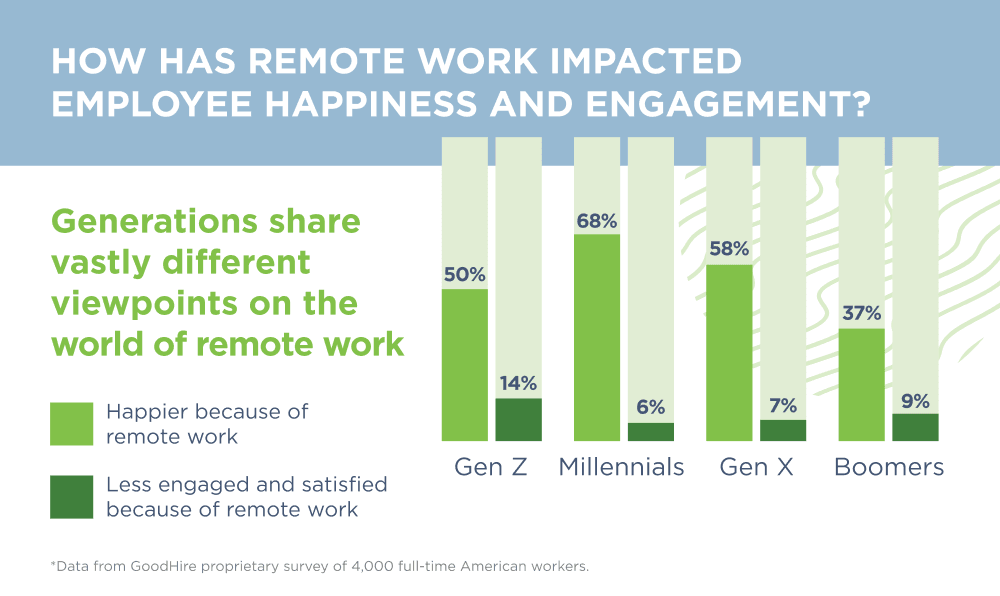
Overall, while remote work brings increased happiness to all but Baby Boomers, it’s apparent that engagement and satisfaction are not a concern for remote workers of any age.
So, what does all of this data tell us?
Millennials seem to be the overall happiest group at work. Baby Boomers are most motivated to earn more, perhaps due to financial losses in earlier career stages. Gen X seems fairly happy at work and without the strongest opinions on any hot workplace issue. Lastly, Gen Z most dislikes remote work and feels less engaged because of it.
This data should infer that Millennials are staying at their jobs longer, forging a career at one company while the other groups continue to look for new opportunities often. But when all generations were asked if they would be searching for new jobs in the next 12 months, it turns out that Millennials — 46% — are actually the most likely to jump ship for a new opportunity.
Boomers, nearing the end of their careers, are the least likely to search for a new gig (19%), and Gen X (36%) and Gen Z (34%) share similar feelings about finding new employment in the near future.
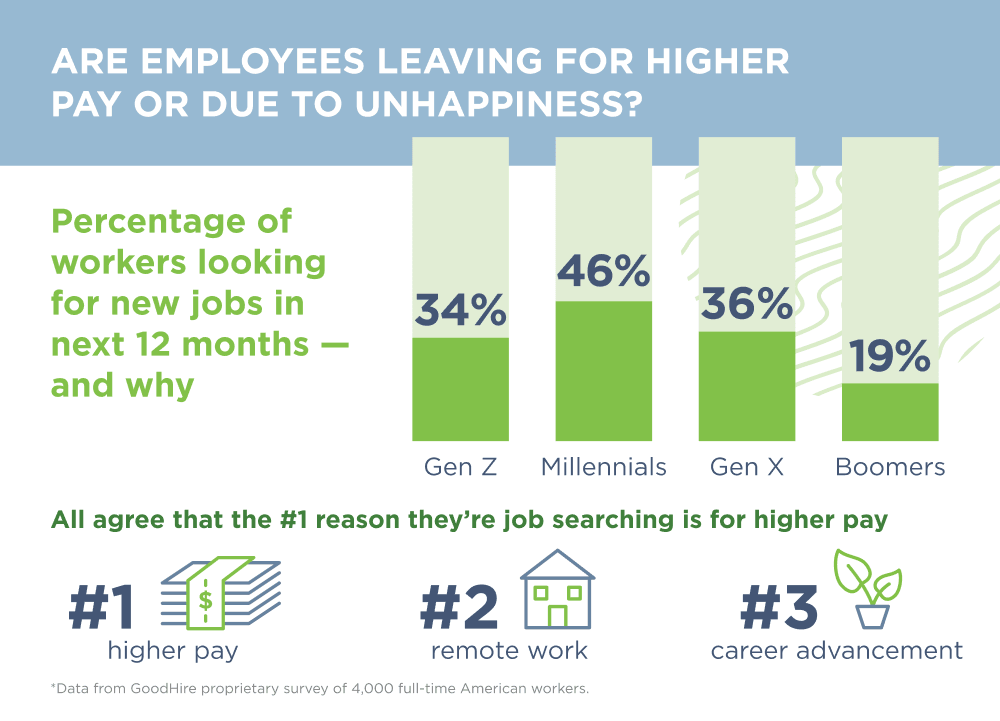
We’ve learned that happiness at work might not be the main driver for staying at a job or leaving for new opportunities.
We confirmed that sentiment by asking why a job search might occur in the next 12 months.
Extremely unsurprising was the top answer from each generation.
Yes, you guessed it … they all want to make more money.
GoodHire’s research shows a distinct generational divide when it comes to the many different aspects of work and life. Conversely, this survey uncovered agreement across the board on two very compelling workplace debates — remote work engagement and a four-day workweek preference.
Of course, it’s important to remember that differences by generation are always going to be present in work and life due to the vastly different eras that have shaped individuals in each respective generation.
Baby Boomers were taught to follow the traditional path of going to college and spending an entire career with one company. They learned loyalty and tradition during the early years of their careers.
Next, Gen Z members disrupted that path by navigating from job to job rather than working at a single company for life.
Millennials then took that disruption even further by jumping from job to job more than the generation before them and using technology to become young entrepreneurs.
And then there is Gen Z. This group of young workers is currently forging a path of their own, using technology and the plethora of resources available to them to do things their own way and at warp speed. They’ve sped up the process and some have earned more money than a Baby Boomer ever could have imagined having at a young age.
Overall, generational divides will always exist, but when it comes to the workplace, strong feelings exist from each generation and there’s no way to predict what trends or paths will be created by the next generation.
We will all just have to wait and see.
For more information on GoodHire’s research, or to request graphics or an interview about this study, please contact press@goodhire.com.
All data found within this report is derived from a survey by GoodHire conducted online via survey platform Pollfish from October 12, 2021 to October 15, 2021. In total, 4,000 adult Americans were surveyed, including an equal number (1,000) from each generation — Baby Boomers, Gen X, Millennials, and Gen Z. The respondents were found via Pollfish’s age filtering feature and were screened in order to ensure they were currently full-time employees at the time GoodHire conducted this survey. This survey was conducted over a five-day span, and all respondents were asked to answer all questions as truthfully as possible and to the best of their knowledge and abilities.
GoodHire’s background check platform makes screening easier and more efficient, so you can hire faster. The platform’s integrated compliance features, intuitive workflows, and automated processes help simplify a complex process to give you peace of mind. GoodHire is an accredited, FCRA-compliant employment screening provider. We offer 200+ employment screening services, including:

The resources provided here are for educational purposes only and do not constitute legal advice. We advise you to consult your own counsel if you have legal questions related to your specific practices and compliance with applicable laws.
Follow Me
As GoodHire’s managing editor, Sara Korolevich produces educational resources for employers on a variety of employment screening topics, including compliance and screening best practices, and writes about GoodHire’s company and product news. Sara’s experience stems from 20+ years working as a B2C and B2B PR and communications professional.
Learn how to run a background check for employment to make informed, fair, and compliant hiring decisions
This step-by-step guide to hiring remote employees will help you develop a remote hiring process, including recruiting remote work candidates; conducting background checks; and making a job offer.
GoodHire’s new survey reveals surprising findings about how workers’ feelings and motivations around remote work have changed in the last year.